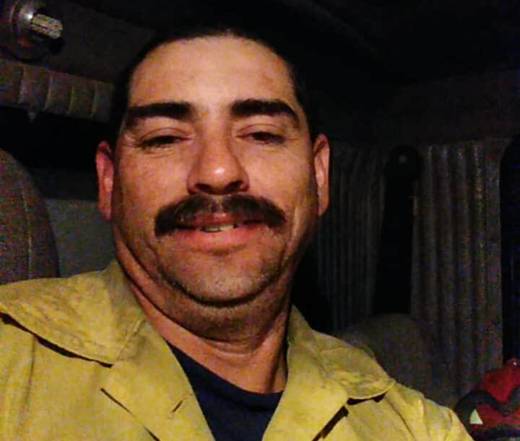The CHP’s investigative findings, which KQED obtained through a public records request, blame the incident on the water tender’s “diminished” braking capacity, along with the vehicle’s speed and turns Paiz attempted as the truck hurtled down the steep, twisting grade.
Paiz lost control of his truck about 7 a.m. on Oct. 16 as he was descending the road on his way to a fire hydrant.
The truck veered right and then rolled onto its left, the CHP report said. The truck slid 75 feet down the pavement before smashing through a guardrail on the left side of the road.
Paiz was pronounced dead at the scene.
One of the first CHP officers to arrive painted a stark picture of the surrounding scene.
“Of note at the time of this collision, Napa Valley was experiencing a historic wildfire, with hillsides burning near the collision scene,” the officer wrote.
The crash ripped the water tank from the vehicle, and the truck came to rest on its roof. Its driver-side door was missing. One exhaust pipe was crushed inward, another was twisted. All of the windows were missing.
Three days before the crash Paiz texted his wife, Bobbie, who was in their hometown of Noel, Missouri.
“I’m headed to the fire line. Pray for us. This one is bad,” he wrote.
A couple of nights later, he sent her a brief video that shows flames in the distance.
“This is our fire. That’s where I’m supplying water to,” he said, adding ironically: “It’s a lot of fun over there.”
Employer Lacked Workers’ Comp
Paiz had been serving as a volunteer firefighter in Noel, Missouri. He grew up in Southern California’s Coachella Valley.
He was hired by Red Bluff-based Tehama Transport, one of the hundreds of private contractors that supply firefighting equipment, such as water tenders and bulldozers, to Cal Fire and the U.S. Forest Service.
After the crash, California regulators learned that Tehama Transport did not have workers’ compensation insurance. The state Labor Commissioner’s Office fined the company and ordered it to cease operations.
A hearing officer rejected claims by the company’s attorney, Scott Rubright, that requiring small firms like Tehama to treat workers as full-time employees with benefits could put many of them out of business.
Rubright argued that those requirements could deprive firefighting agencies of resources that are essential to combating big blazes across California.
Rubright said Tehama no longer supplies heavy equipment for Cal Fire’s firefighting efforts.
“Tehama Transport is now out of the fire business, which is unfortunate, because we could certainly use them on the fire here in Redding,” Rubright said in an email last week, referring to the Carr Fire that has been burning in Shasta County.
Truck’s Safety Problems
CHP documents disclosed after after the crash showed the water tanker had been briefly taken off the road in 2016 because of maintenance concerns.
The documents showed that a June 2016 safety inspection of the vehicle at an agency facility in Shasta County found five violations, including one that was serious enough that the Highway Patrol ordered the truck out of service until the problem was corrected.
The post-crash inspection found several “pre-existing” mechanical problems with the vehicle.
Three of the truck’s six brakes were out of adjustment and all six of its brake drums were oversized.
“These deficiencies directly affected the safe operation of the vehicle on the roadway and they were determined to be a contributing factor in this collision,” the report said. “It was evident that the motor carrier’s systematic maintenance program was inadequate.”
Sgt. Clarke, with the CHP’s crash investigation team, said the brake problems were so serious that the water tender should not have been in operation.
“That truck should not have been on the road,” Clarke said.
The CHP determined that the water tender was traveling too fast downhill but it could not conclude exactly what speed it was going at the time of the crash.
The agency’s investigative findings also point to decisions Paiz made right before the crash.
They note that Paiz “entered a series of sharp downhill curves, at an increasing and unsafe speed.”
“It’s hard to say that the person behind the wheel has no fault in this crash,” Clarke said. “It’s obviously a tragedy. He died trying to help stop these wildfires. But in the grand scheme of things, there’s only one person in that truck.”
The CHP investigation says Paiz made an “unsafe steering input” that resulted in the vehicle overturning.
Tire friction marks found on Oakville Grade indicated a significant amount of “weight shifting” in the truck before the crash. Investigators believe Paiz was making increasingly severe left and right turns, some of which may have been a part of his struggle to maintain control.
